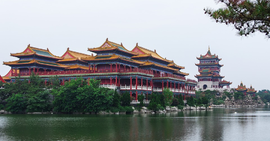Gong Suweiai
| Gong Suweiai | |
| Type | |
|---|---|
| Type |
Public advisory council |
| History | |
| Founded | 1659 AN |
| Structure | |
| Seats |
391 seats |
Political groups |
Diwang Party (135)
Opposition (256) |
| Elections | |
Voting system |
Members appointed. |
Last election |
None |
Next election |
None |
| Meeting place | |
Haigui Palace, Daocheng | |
The Chidao Emperor Imperial Household | Imperial Stewardship Teachings of the Empire
Ministries & Secretariats: Ministry of Truth | Ministry of Purity | Ministry of Stability Chao Suweiai formerly known as National Diet Defunct:
Political Factions: Guanchang | Kantai-ha (Navy) | Gunbatsu (Army) | Shanghu (Traders) Defunct: Other institutions Tianchao Chuandui | Imperial Armed Forces | Young Wandering Society | Tegong |
The Gong Suweiai, or Public Council, acts as a public advisory council of the Jingdaoese Empire. It consisted of several court officials, nobles and bureaucrats. With the crackdown on the Imperial Yuan and Seanad in 1659 AN, its main goal was to aid the Chidao Emperor in His daily tasks as Heavenly Light. In contrast to the Sifang Suweiai, the decisions and debates in the Gong Suweiai are open for the public. Decisions are publicized in newspapers across the Empire.
Members are appointed by Imperial Ordinance, and often based on certain merits like wealth, family ties and ethnic origin.
Duties
The Council, while depending on the goodwill of the Emperor, is responsible for a certain amount of issues:
- proposed amendments to the Constitution of the Empire,
- proposed amendments to the Imperial Household Law,
- matters of constitutional interpretation, proposed laws, and ordinances,
- proclamations of martial law or declaration of war,
- treaties and other international agreements,
- matters concerning the succession to the throne,
- declarations of a regency under the Imperial Household Law,
- matters submitted by the Heavenly Light. generally on the advice of the Grand Secretariat or Sifang Suweiai.
Chairman of the Council
| Position | Holder | Tenure |
| Chairman of the Council | Zhong Yin, Viceroy of Bangou (Bureaucrats) | 1659 - 1660 |
| Yikuang Xan, Head Steward of the Palace (Bureaucrats) | 1660 - |
Members of the council
While not elected, the 391 members of the Gong Suweiai are traditionally re-appointed (or removed from office) every five Norton years. Officially, their membership depends solely on the goodwill of the Heavenly Light, who takes into account the advise of provincial assemblies, imperial advisers and court officials. The number of 391 advisers dates back to the Imperial Yuan, which held the same number. While relatively stable (most members are re-appointed term after term), it sometimes depends from the influence of the factions.
Legislature of 1659
| Party logo | Party name | Leader | Ideology | Seats |
|---|---|---|---|---|
| Guanchang |
135 / 391 | |||
| Kantai-ha |
80 / 391 | |||
| Gunbatsu | Tzao Yao |
152 / 391 | ||
| Non-Aligned | Various |
24 / 391 |
